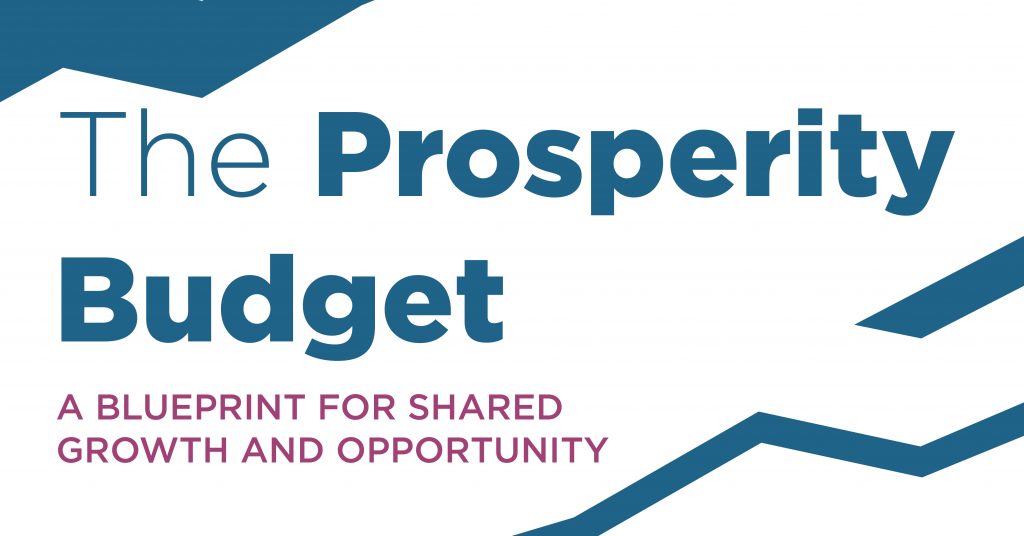
AUGUSTA, Maine – Maine Center for Economic Policy (MECEP) today released “The Prosperity Budget,” a biennial state budget blueprint that lays the groundwork for a stronger, more inclusive economy.
“The Prosperity Budget is a down payment on a brighter future for Maine,” said Sarah Austin, MECEP’s tax and budget analyst and author of the proposal. “It fully funds Maine’s public schools for the first time ever, expands access to health care and benefits that promote healthy families, and boosts the public services and infrastructure that foster economic growth. Lastly, it reverses course after eight years of budget-busting tax cuts for the wealthiest and ensures the adequate, fair revenue necessary to put Maine on an upward trajectory for years to come.”
In November, voters elected candidates who endorsed a people-powered approach to our economy – one that prioritizes good schools, health care, job training and infrastructure. Now, those elected officials can deliver on their promises with a budget that puts prosperity within reach for all Mainers.
Seizing that opportunity, however, requires overcoming revenue challenges established under Gov. Paul LePage. During the last eight years, round after round of tax cuts primarily benefited the wealthiest Mainers and deprived the state of revenue necessary to build thriving communities and an inclusive economy.
Maine’s current revenue projections are inadequate to meet the state’s needs. Policymakers must appropriate an additional $644 million over the prior biennial budget simply to meet statutory obligations to education, health care, and local services — all of which have been underfunded for years. Meeting those core commitments is made more difficult by the past eight years of tax cuts, which will result in $864 million of lost revenue this budget cycle.
Mainers understand the relationship between tax policy, jobs and our economy. Voters have endorsed raising taxes on the wealthiest Mainers to fund education, and public opinion research shows Mainers are skeptical that trickle-down tax policy will improve Maine’s economy. Yet today, the top 1 percent in Maine pays the lowest effective state and local tax rate of any group.
The Prosperity Budget restores Maine’s lost revenue by enacting progressive reforms to Maine’s income tax code, closing loopholes that allow corporations and the wealthiest households to avoid paying taxes, and exporting our tax base by asking visitors to pay increased meals and lodging taxes. Together, these tax reforms put Maine in a position to meet its funding obligations and lay the groundwork for greater opportunity, growth and prosperity now and in the future, while improving the state’s ability to weather a recession or other economic shock.
“Good schools and robust job training, policies that promote healthy families, infrastructure and public services that sustain the economy and adequate, fair revenue are the key elements necessary in a state budget. The Prosperity Budget delivers on all counts,” said MECEP Executive Director Garrett Martin. “With our budget blueprint, we hope to kick-start a conversation about how to overcome Maine’s revenue hurdles so we can seize the opportunity of this moment. We look forward to working with Gov. Janet Mills’ administration and the Legislature to pass a budget that works for families, communities and our economy.”
Summary of The Prosperity Budget’s Key Provisions:
(Click here to read the full budget proposal, including appropriations and revenue figures. Click here for a one-page summary document.)
Ensuring Policy Advances Racial Equity:
- Create a Permanent Commission on the Status of Racial and Ethnic Populations in Maine to address our history of racist policies and practices and erase racial disparities in economic, health, and educational outcomes for people of color
Good Schools, Good Jobs
- Fully fund Maine’s public schools and expand early childhood care and education so that every Maine student has the opportunity to succeed
- Fully fund Maine’s Adult Education system, providing critical skills and job training to fill demand for middle-skill workers
- Triple the State of Maine Grant to make college more affordable for Maine students
- Enact universal paid sick days and paid family and medical leave, protecting Mainers’ livelihood and ensuring no one has to choose between their family’s health and their paycheck
- Strengthen enforcement of workers’ rights by reinvigorating the Maine Department of Labor’s Wage and Hour Division
Healthy Families:
- Fully fund Medicaid and restore eligibility for legally present immigrants and increase funding for children’s and adults’ dental care
- Increase funding for family planning to protect crucial reproductive and preventative health care from threatened cuts in Congress
- Increase funding for programs and services to combat the opioid epidemic to keep sick Mainers out of jail, increase recovery and save lives
- Increase funding for services that support seniors and Mainers with disabilities, including increased reimbursements for the direct care workers who provide comfort, health and dignity to our loved ones
Communities with Strong Foundations:
- Funding for a state workers study to investigate and correct public-sector staffing cuts and wage stagnation that have diminished services for Maine families and businesses
- Bonding for transportation and broadband infrastructure to connect Maine’s families and businesses and create the conditions that allow entrepreneurs to thrive
Revenue for a Brighter Future:
- Income tax reform including two new brackets (at 9.5 percent and 10.5 percent) for the wealthiest Mainers; an increased standard deduction with a phaseout for higher-earning filers; and the elimination of non-medical itemized deductions
- Tripling the Maine Earned Income Tax Credit and expanding the credit so that all adults are eligible for this proven effective anti-poverty measure
- Reducing the Maine Estate Tax Exemption to 2011 level of $2 million for family estates
- Closing the offshore tax haven loophole, which allows corporations to avoid paying taxes
- Re-basing the hospital tax to reflect current profits
- Tapping the value of Maine’s record-breaking tourism industry by increasing the meals tax from 8 percent to 9 percent and the lodging tax from 9 percent to 11 percent


